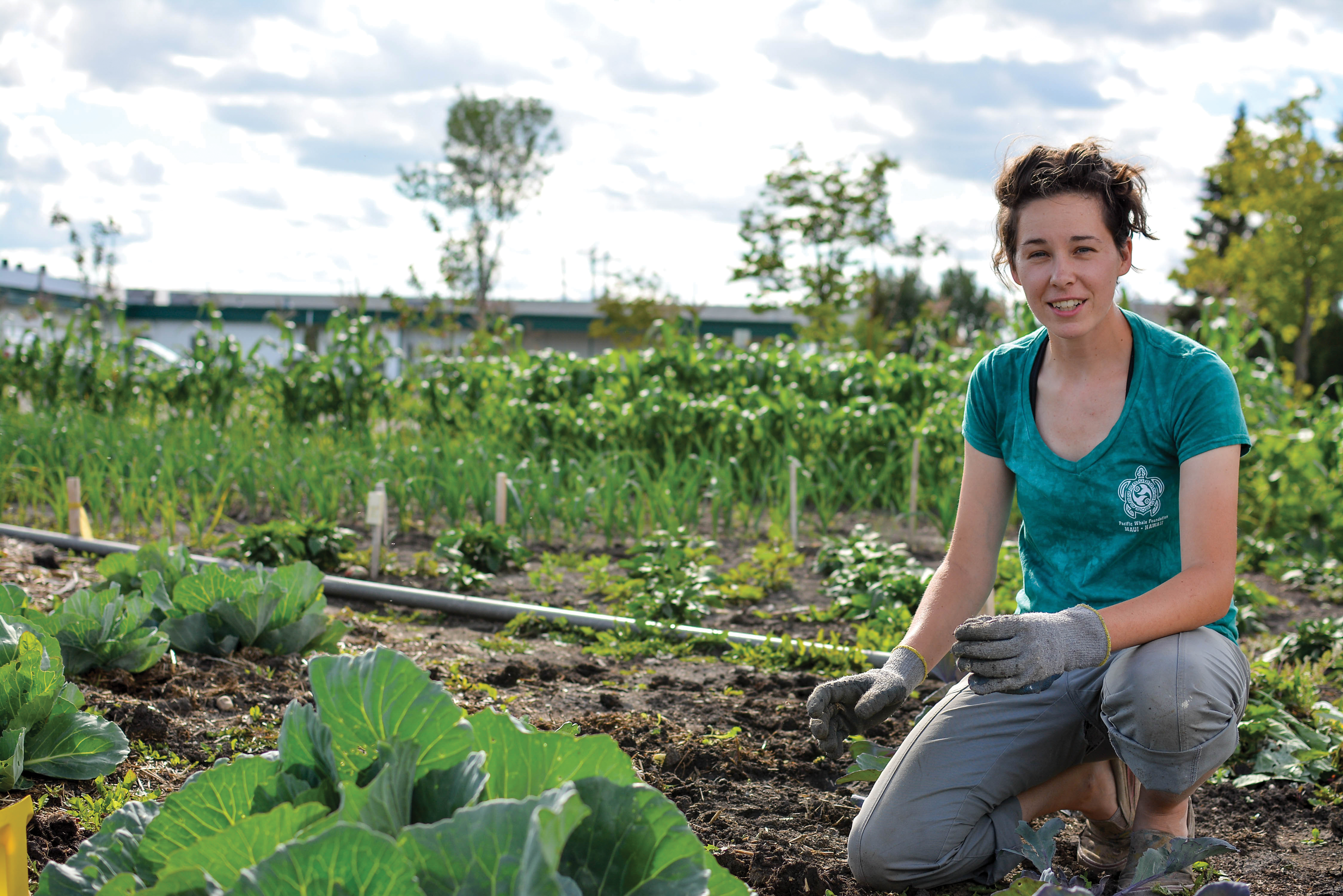Every year, thousands of Canadians decide that when they go to work, their job should somehow help the planet. For many, starting environmental careers means enrolling at colleges or universities to learn how to make their occupations more sustainable. There are hundreds of environmental programs at nearly every Canadian college and university.
Every year, thousands of Canadians decide that when they go to work, their job should somehow help the planet. For many, starting environmental careers means enrolling at colleges or universities to learn how to make their occupations more sustainable. There are hundreds of environmental programs at nearly every Canadian college and university.
Students aren’t limited to degrees offered by environment faculties. Nearly every subject under the sun can have an environmental focus. Political science, economics, business, geography and gender studies, to name a few fields, have launched environmental careers with different perspectives and different ways of contributing to a greener future. You could strengthen your degree and add expertise with a minor such as ecology, economics or environmental law. You could specialize in a particular region like South America, or a particular culture, like Inuit First Nations.
David Powel, the Undergraduate Student Advisor and Placement Coordinator for the University of Toronto’s School of the Environment, lists possibilities like an architect who designs LEED-certified green buildings, a chemist who devises less environmentally damaging manufacturing methods, and an epidemiologist quantifying the effects of pollution on human health.
Given this sea of possibilities, it’s helpful to break things down. College certificates or diplomas generally take much less time from enrollment to paycheque than full university degrees. Some programs are less than a year. The best are practical, focused and boast a high work-placement rate. Employment opportunities out of college depend on the program and region. For students who know they want to do a specific trade and who have done their homework on career prospects, this option is hard to beat.
Successful CSOs do not just improve the environmental performance
of a company – they do it profitably
Students can often have more flexibility in customizing university degrees with various majors and minors. There are year-long diplomas, four-year bachelor’s degrees, one- to three-year master’s degrees, and PhDs that take three to six years. Degrees can have more than one major, any number of minors and specializations. This flexibility makes it dangerous to give general advice about what sort of classes to keep an eye out for, but according to University of Waterloo Faculty of the Environment graduate Jackie Moore, seminars tend to be more engaging than lectures, particularly when the seminar is on a topic the professor is actively researching. Finding these options takes only a few minutes of investigation and can lead to inspiring experiences.
Despite the vast range of possible environmental careers, the job market is very tough. Employers, student advisors and graduates told me one thing over and over: Get. Experience. Those college and university programs that offer credible opportunities to get work experience before graduation give their students a massive advantage.
One way that universities and colleges do this is by offering co-op programs, or the option of doing several work terms in order to get a co-op designation on a degree. Both Powel and Carleton University student advisor Patricia Ballamingie told me that academic chairs whose programs offer co-ops often see graduates hired directly into the same organizations where they did their work placements.
Another benefit to this route is that the work experience is paid. Government departments like Environment Canada generally offer fair compensation to student workers. In the private sector, pay varies substantially from field to field and placement to placement, but in the best cases, co-op students can earn enough to cover their tuition. It can’t be stressed enough how valuable this is: Having less or no debt affects more than just a graduate’s standard of living. It also allows grads to pursue the careers they’re passionate about without being forced to compromise by the pressure to repay loans.
It’s also no small thing to be able to try out one’s field of choice while there’s still time to make a course correction. The best placements, whether co-op terms, summer internships or weekend volunteer jobs, complement lectures by proving the value of what is taught in class.
Some environmental programs have internships instead of co-ops. These serve as stepping stones between graduating and finding employment. Unfortunately, internships for environmental students are typically unpaid. This practice isn’t without controversy: In March 2014, the Ontario Ministry of Labour cracked down on unpaid internships that don’t meet certain criteria, such as providing high-quality training.
If a program doesn’t have a co-op,
internship or other formal work experience component, there’s always volunteering. This doesn’t have to be with a company or a government department. There are websites to search for jobs with non-profits, such as goodwork.ca and charityvillage.com.
There are bound to be an embarrassment of opportunities right outside the lecture hall, with foodbanks, gardens, bike shops, advocacy groups, environmental student associations and more.
Get the most out of your time in school by participating in environmental student groups, clubs and events. Academic advisors extol the virtues of on-campus activities for enhancing resumes and gaining skills to round out academic training. They are also bound to be useful when you are trying to convince a potential employer that you’re passionate about what you do.
But grads have told me the main reason to join student groups is that they’re fun. They talk about the connections they made through on-campus organizations and how important these peers have been for personal growth, connecting with local environmental movements and staying motivated. Naomi Watts, who earned environmental degrees from UW and the University of Guelph, lamented that she wasn’t more active in her first two years and got involved only later.
Personal growth and employability can be two sides of the same coin. Finding your passion and finding your career should never be mutually exclusive. Plugging into the culture and energy of young environmental professionals through volunteering and student groups is a really authentic way to network. Finding a fulfilling career certainly isn’t absolutely the only thing of value to be gained at a college or university environmental program, but it is a big reason for just about every aspiring student.
An environmental program can be the start of your journey, whether you are aiming to clean up a big multinational corporation by becoming its Sustainability Officer, a government scientist measuring that corporation’s contamination, or the leader of a green organization protesting it. Industry, the government and non-profits all need people who can deal with this part of their operations.
The point is that wherever we go, and whatever we do, there’s the Earth.
Let’s get the grim news out of the way. There will always be a place for NGOs, but stable jobs that come with a livable wage in that sector are elusive. Government funding for environmental organizations is falling. Even well-known organizations have been forced to pare back and rely almost entirely on volunteers.
Watts, who has been sounding the job market for years, emphasized that NGO opportunities paying more than a small honorarium are hard to find. Their scarcity makes it extremely competitive to get started in a permanent gig. In her experience, even the positions that aren’t voluntary pay less than a living wage. After graduating, the average Canadian student has somewhere around $25,000 in debt. The bottom line is that many will not be able to find a career with non-profits because either they are priced out or the paying jobs are too competitive.
Government, on the other hand, does provide employment to tens of thousands of environmental professionals. However, the largest level of government – federal – is not trending in a good direction. Despite employing over 20,000 people across departments like Environment Canada, Natural Resources Canada, and Fisheries and Oceans Canada, there have been some disturbing developments.
In 2008, new rules were instituted that put barriers between the department and the media, preventing employees in departments like Environment Canada and Natural Resources Canada from sharing their work with the public, effectively muzzling them. There have also been a slew of cuts to the government’s environmental programs, which has made these programs less effective at fulfilling the government’s environmental responsibilities and decreased morale in the civil service.
For the other levels of government, employment opportunities vary from place to place, but there are jobs everywhere. Right down to municipal governments, there is generally someone whose job it is to shape environmental regulations, manage the region’s parks or even just make the civil service itself more environmentally sustainable.
The healthiest job market is in the private sector. Try this challenge: Name an industry that doesn’t have to consider the environment.
Even an industry seemingly antithetical to the green movement, like oil and gas, needs environmental professionals. There are the geologists, engineers and surveyors who first find the resource. They then team up with ecologists, environmental law experts and a dozen other technical professions to draw up plans for government approval. Once the project is underway, they have to do continual environmental testing and when it’s all out of the ground, there’s still the long-term remediation phase to execute. It’s a similar story with forestry, fishing, farming, mining and manufacturing.

At the University of Alberta students, like Nicole Martin here, can volunteer on the Prairie Urban Farm where the aim is to increase food security in their community.
I thought I’d stumped myself with the financial sector. Neither their inputs nor their outputs are tangible things, so what do they care about environmental stewardship? But of course there are publicly traded companies manufacturing environmentally friendly products and producing clean energy. To pick the winners, you would need to understand the engineering behind their green technologies, the government policies and subsidies companies can take advantage of, and what can be successfully marketed to eco-conscious consumers. There’s also the growing fossil fuel divestment movement to manage, and even for blue chip companies, stock prices are often affected by companies’ environmental performance. In the short run, poor performance can result in fines, boycotts, additional regulation and product bans. In the long run, a loss of social license can cripple growth. A savvy investor needs to know about a company’s environmental record and culture and foresee how that will affect the bottom line.
Maybe there’s an overlooked corner of the private sector that, for now, does not employ many environmental professionals. That corner might turn out to be an untapped supply of green jobs. Whether or not that is so, there is no shortage of opportunity.
Some people want to work outdoors and decide that a post-secondary program rooted in fieldwork is the best way to get out on the trunk roads. Others decide that a master’s in conservation biology will be their route to a management position with an environmental monitoring company. Still others aim for the top of the `corporate ladder: a career as a company’s Chief Sustainability Officer (CSO).
The number of CSOs has more than quadrupled since 1995. Sometimes companies create these positions in response to shareholder pressure, other times they recognize the need to go green and want to see the transformation done well. Successful CSOs do not just improve the environmental performance of a company—they do it profitably—so it’s not surprising that most come from business backgrounds.
There is also a smaller but important need for environmentalists in academia at universities, research institutes and
think tanks. This requires a big investment in education – generally a PhD.
According to the Environmental Careers Organization Canada, there were 730,000 Canadian environmental professionals in 2013 across all sectors, a growth of 7 percent since 2010. They also estimate that nearly 20 percent of Canadian employers have at least one environmental employee.
The point is that wherever we go, and whatever we do, there’s the Earth. No matter what your passion is, there is opportunity for a career that makes a positive impact on the planet. Canadian post-secondary education is diverse enough to offer a path to everyone, whether that’s a short, concise certification or a flexible, evolving degree.
Jumpstart your environmental career by checking out the green job listings on eco.ca, workcabin.ca, goodwork.ca, charityvillage.com and rcen.ca.
Ben is a former A\J editorial intern. He’s currently a freelance writer based in Ottawa. He tells stories about nature, science and policy.
Ben is a former A\J editorial intern. He’s currently a freelance writer based in Ottawa. He tells stories about nature, science and policy.













